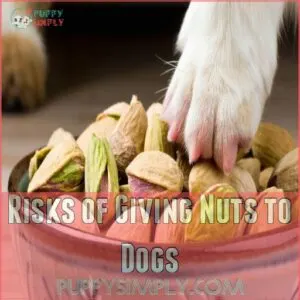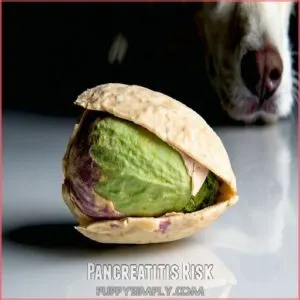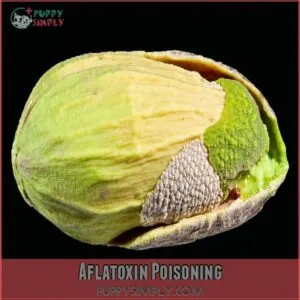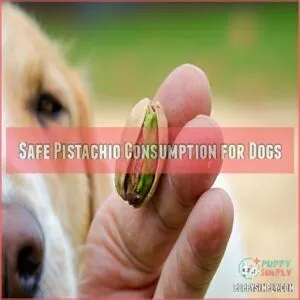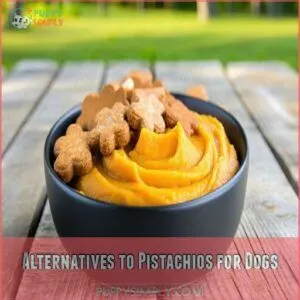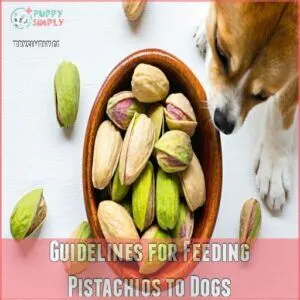This site is supported by our readers. We may earn a commission, at no cost to you, if you purchase through links.

Although pistachios aren’t toxic to dogs, they’re high in fat and can cause stomach upset, pancreatitis, and even dangerous mold exposure.
If your pup manages to snag a single shelled pistachio, don’t panic – but make it a one-time treat.
The real danger lies in salted varieties and shells, which pose choking hazards.
Your furry friend’s digestive system simply isn’t designed for processing nuts, but there are plenty of safer, tail-wagging treats that’ll make both of you happy.
Table Of Contents
- Key Takeaways
- Risks of Giving Nuts to Dogs
- Can Dogs Eat Pistachio Nuts?
- Nutritional Value of Pistachios for Dogs
- Health Risks of Pistachios for Dogs
- Safe Pistachio Consumption for Dogs
- Alternatives to Pistachios for Dogs
- Guidelines for Feeding Pistachios to Dogs
- Frequently Asked Questions (FAQs)
- Are pistachio nuts good for dogs?
- Can you eat pistachios on keto?
- Can dogs eat chili pistachios?
- Are pistachios bad for dogs?
- Can dogs eat moldy pistachios?
- How many pistachios can a dog eat a day?
- How many pistachios can a dog eat?
- Which nuts are poisonous to dogs?
- Can dogs eat pistachios?
- How many pistachios can a dog eat?
- What nuts can dogs not eat?
- What if my dog ate a piece of pistachios?
- Who should avoid pistachios?
- How long does pistachio poisoning take to show symptoms?
- Are raw pistachios more dangerous than roasted ones?
- Can puppies safely eat pistachios at all?
- Do pistachios affect different dog breeds differently?
- What should I do if my dog ate shells?
- Conclusion
Key Takeaways
- Pistachios aren’t toxic to dogs, but their high fat content can cause digestive upset and pancreatitis.
- Salted pistachios and shells are especially dangerous; shells pose a choking hazard.
- Even small amounts of pistachios should be given rarely, as treats should only make up a small percentage of your dog’s daily calories.
- Many safer, healthier treat options exist for your dog; consult your vet before giving them any new foods.
Risks of Giving Nuts to Dogs
You might think nuts are a healthy treat for your furry friend, but these crunchy snacks can pose serious risks for dogs, from digestive problems to dangerous choking hazards.
While some nuts are safer than others, it’s important to know that their high fat content can trigger pancreatitis in dogs, and certain varieties like macadamia nuts are downright toxic.
High Calorie and Fat Content
Regarding your dog’s health, those tempting pistachios pack a powerful caloric punch.
A single cup contains nearly 700 calories and significant amounts of fat.
Just like humans watching their waistline, dogs need to maintain a healthy weight.
Regular consumption of high-fat nuts can lead to obesity, which increases their risk of developing serious conditions like pancreatitis.
Even occasional treats need careful portion control.
Gastrointestinal Upset
Beyond their high calorie count, nuts can wreak havoc on your dog’s digestive system, and pistachios in particular pose a risk due to their high-fat content for dogs.
Many dogs experience stomach pain, bloating, and uncomfortable digestive issues after eating nuts.
If your furry friend has a sensitive stomach, they might face vomiting or diarrhea.
Just like humans, dogs can have food sensitivities that make nuts particularly troublesome for their digestive system.
Toxic Coatings
Store-bought nuts often come with dangerous coatings that can harm your furry friend.
Chocolate-covered nuts, commonly found in trail mixes, contain theobromine, which is toxic to dogs.
Similarly, nuts seasoned with garlic, onion, or spicy blends can cause severe digestive issues.
Even seemingly innocent coatings like xylitol, a common sweetener in flavored nuts, can be life-threatening to your dog.
Choking Hazard
During snack time, nuts can pose a serious choking risk for your furry friend, especially small dog breeds.
The dangers become clear when you consider that nuts can:
- Get stuck in your dog’s throat due to their size and shape
- Cause breathing difficulties if not chewed properly
- Create blockages, particularly with shells or fragments
That’s why it’s essential to stick with dog-specific treats sized appropriately for your pup’s mouth.
Moldy Nuts Toxicity
Moldy nuts pose a serious threat to your dog’s health, hiding a dangerous toxin called aflatoxin.
Just like choking hazards, these invisible invaders can lead to severe complications.
| Symptom | Severity | Time to Onset | Action Needed |
|---|---|---|---|
| Vomiting | Moderate | 2-6 hours | Contact vet |
| Lethargy | Severe | 4-12 hours | Emergency care |
| Jaundice | Critical | 12-24 hours | Immediate vet |
| Liver damage | Life-threatening | 24-48 hours | Hospital care |
Can Dogs Eat Pistachio Nuts?
While sharing snacks with your furry friend might seem fun, pistachios require careful consideration. Like most nuts, pistachios aren’t toxic to dogs in small amounts, but they come with several important cautions that every pet parent should know.
- Pistachio shells pose a serious choking risk and can cause dangerous intestinal blockages if swallowed
- The high fat content makes them a risky choice for dogs prone to pancreatitis
- Mold growth on pistachios can produce harmful toxins that could make your pup sick
- Salted varieties can lead to excessive thirst and sodium issues
If you’re looking for safer alternatives, you can explore dog pistachio treats online, such as those found on websites like dog pistachio treats.
Think of pistachios like that friend who’s fun in small doses but can cause trouble if they hang around too long. While your dog can technically eat them, there are safer treat options available that won’t keep you up at night worrying about potential health issues.
Nutritional Value of Pistachios for Dogs
While pistachios contain protein and essential vitamins B1, K, and B6 that support your dog’s energy and nervous system, your furry friend can get these nutrients from their regular dog food.
Pistachios pack 560-572 calories per 100 grams, making them a high-calorie choice that should be limited in your pet’s diet.
Protein Content
Protein-packed pistachios might seem like a tempting treat for your furry friend.
While these nuts do contain protein, your dog already gets the right amount from their regular diet.
A balanced dog food provides all the protein they need, making pistachios an unnecessary addition.
If you’re concerned about your dog’s protein intake, lean meats like chicken or turkey are safer alternatives.
Essential Vitamins
Beyond their protein content, pistachios pack a powerful punch of vitamins that catch many pet owners’ attention.
These nuts contain vitamins B1, K, and B6, which play key roles in your dog’s health.
However, your furry friend can get these same nutrients from their regular dog food, making pistachios an unnecessary addition to their diet.
Let’s consider what these vitamins do for your pup.
Importance of Vitamins for Dogs
These vitamins found in pistachios play key roles in your dog’s health and well-being. Here’s what they do:
- B1 powers up your pup’s energy levels and keeps their metabolism running smoothly
- K helps their blood clot properly, like a natural band-aid
- B6 supports a healthy nervous system, keeping your dog alert and responsive
- Together, these vitamins boost cognitive function, helping your furry friend stay sharp
Remember, though, your dog’s regular food already provides these nutrients in safer amounts.
Health Risks of Pistachios for Dogs
While pistachios can seem like a harmless treat, it’s also important to be cautious with other nut butters and seeds, as even alternatives like SunButter for dogs, can be high in fat content, these nuts pose serious health risks to your dog, including pancreatitis from their high fat content and potential poisoning from harmful molds.
Your furry friend could develop severe digestive issues or even need emergency care if they eat too many pistachios, especially since dogs are more sensitive to nut-related complications than humans.
Pancreatitis Risk
One bite of these fatty nuts could spell trouble for your pup’s pancreas.
High-fat content in pistachios can trigger pancreatitis, especially in sensitive breeds like Schnauzers.
As with other nuts, you should pay close attention to the nuts safe for dogs to avoid any potential risks.
| Risk Factor | Impact | Prevention |
|---|---|---|
| Fat Content | Can inflame pancreas | Limit treats |
| Breed Type | Some more susceptible | Know your breed |
| Diet History | Previous issues increase risk | Monitor diet |
Watch for decreased appetite, vomiting, or lethargy – these could signal pancreatitis.
Always check with your vet before introducing new treats.
Aflatoxin Poisoning
Pistachios can harbor dangerous Aspergillus mold, which produces aflatoxins – toxic compounds that can seriously harm your dog.
Aflatoxin poisoning is rare, but it’s potentially fatal and requires immediate veterinary care.
Watch for symptoms like vomiting, lethargy, loss of appetite, and jaundice.
To prevent this risk, always store pistachios properly in a cool, dry place and never feed your dog nuts that appear discolored or moldy.
Safe Pistachio Consumption for Dogs
You can safely share pistachios with your dog by offering one or two unsalted, unshelled nuts as an occasional treat.
When giving pistachios to your furry friend, remember to keep in mind their size and overall health, as these nuts should make up less than 10% of their daily calorie intake.
Limiting Pistachio Intake
While sharing treats with your furry friend is tempting, moderation is key regarding pistachios.
Just like humans shouldn’t eat an entire cake, your dog needs limits on these nutty treats.
Here’s what you need to know:
- Keep portions to 1-2 pistachios per treat session
- Treat sessions should be limited to once or twice per week
- Total treats should never exceed 10% of daily calories
Choosing Unsalted Pistachios
If you’re thinking about giving your furry friend a treat, unsalted pistachios are the safer choice.
Regular salted varieties can spike your dog’s sodium intake, potentially leading to dehydration or more serious health issues.
Make sure to remove shells completely before offering any pistachios – they’re not just tough to digest but can be dangerous.
If you’re comparing brands, always opt for plain, unsalted options without added seasonings or flavors.
Avoiding Daily Consumption
Many dog owners wonder about making pistachios a regular treat, but daily consumption isn’t recommended.
These nuts pack a hefty caloric punch and can overwhelm your dog’s digestive system over time.
Think of pistachios as an occasional special treat rather than a daily snack.
Stick to offering them once or twice a month at most, keeping portion sizes minimal to avoid potential health complications.
Considering Dog’s Size and Health
Your dog’s size and overall health play key roles in determining safe pistachio portions.
A Great Dane can handle more nuts than a Chihuahua, but that doesn’t mean they should.
Consider your pet’s weight, breed-specific health risks (like Schnauzers’ susceptibility to pancreatitis), and existing conditions.
If your furry friend has allergies or digestive issues, it’s best to skip pistachios entirely.
Alternatives to Pistachios for Dogs
You’ll find plenty of safer and equally tasty treats for your furry friend instead of pistachios, from specially formulated dog treats to pet-safe fruits and vegetables.
Your dog can enjoy nutritious alternatives like plain pumpkin, lean turkey, or peanut butter-flavored treats that are designed with their health in mind.
Dog Treats Formulated for Nutritional Needs
Smart pet parents choose specialized dog treats that pack the right nutritional punch for their furry friends.
Commercial dog treats are specifically formulated to meet canine dietary needs, and unlike some human treats like cake containing toxic ingredients, while satisfying their snacking urges.
For a wide range of options, consider exploring healthy dog treats online.
- Premium dog treats contain balanced proteins, fats, and essential nutrients
- Many brands offer dental benefits, helping maintain oral health
- Size-specific treats guarantee safe consumption for different breeds
Safe Human Foods
Looking for healthier alternatives to pistachios?
Plain pumpkin offers fiber and nutrients that support digestive health.
Fresh carrots make excellent crunchy treats while promoting dental health.
Consider safe human foods like lactose-free yogurt alternatives, such as dog-friendly frozen treats.
Lean proteins like unseasoned turkey or chicken (without skin and bones) provide essential nutrients without the risks associated with nuts.
Remember to introduce new foods gradually and keep portions small as part of a balanced diet.
Peanut Butter-Flavored Dog Treats
Instead of giving your pup pistachios, you can consider peanuts as an alternative, but be sure to choose unsalted peanut options without shells to minimize potential risks. Peanut butter-flavored dog treats offer a safer, specially formulated alternative that’ll make their tail wag.
These treats are designed with your dog’s health in mind and come packed with nutrients they need.
Here’s what makes them a great choice:
- Made with dog-safe ingredients
- Portion-controlled for easy feeding
- Available in various sizes for different breeds
- Free from harmful additives and preservatives
Guidelines for Feeding Pistachios to Dogs
If you’re considering sharing pistachios with your furry friend, you’ll need to follow specific guidelines to make sure their safety and well-being.
Your veterinarian can provide personalized recommendations based on your dog’s size, health conditions, and dietary needs, helping you make informed decisions about incorporating these nuts into their treat rotation.
Consulting a Veterinarian
Before introducing pistachios to your dog’s diet, check with your veterinarian.
They’ll evaluate your pup’s specific dietary needs, potential food allergies, and overall health status.
Your vet knows your dog’s complete medical history and can provide personalized recommendations about whether pistachios are a good fit.
They might even suggest better treat alternatives that align with your dog’s nutritional requirements.
Monitoring Dog’s Health
When feeding your dog pistachios, stay vigilant for any health changes. Think of yourself as your pup’s personal health detective, keeping an eye out for these key signs:
- Watch for unusual behavior like lethargy or excessive thirst
- Monitor their bathroom habits for any digestive issues
- Check for symptoms of allergic reactions, including itching or swelling
If you notice anything unusual, contact your vet immediately.
Proper Nutrition for Dogs
Proper nutrition forms the foundation of your dog’s health, going beyond just watching for reactions to treats like pistachios.
For a convenient and safe way to supplement your dog’s diet with pistachio-based products, consider exploring pistachio dog snacks online.
Here’s a quick guide to daily nutrition targets for your furry friend:
| Nutrient Type | Puppy Needs | Adult Needs |
|---|---|---|
| Protein | 28% | 18% |
| Fat | 17% | 9-15% |
| Carbs | 20% | 30-70% |
Remember, commercial dog food meets these requirements, while treats like pistachios should make up less than 10% of daily calories.
Frequently Asked Questions (FAQs)
Are pistachio nuts good for dogs?
Pistachios aren’t recommended for dogs.
While they contain some vitamins, they’re high in fat and can cause pancreatitis.
The shells pose choking hazards, and there’s a risk of mold toxicity.
Stick to dog-specific treats instead.
Can you eat pistachios on keto?
Like a well-oiled keto machine, you can enjoy pistachios on your low-carb journey.
These nuts pack just 5g net carbs per serving.
And they fit nicely into your daily macros when eaten in moderation.
Can dogs eat chili pistachios?
You shouldn’t feed your dog chili pistachios as they contain spices and seasonings that can be toxic.
The high sodium and spicy coating can cause stomach upset, dehydration, and potential pancreatitis in your pet.
Are pistachios bad for dogs?
Just as a small pebble can trip a giant, these tasty nuts pose risks for your furry friend.
Pistachios can trigger pancreatitis, cause choking, and contain dangerous molds.
It’s best to skip sharing them.
Can dogs eat moldy pistachios?
Never feed your dog moldy pistachios – they contain dangerous toxins that can cause severe illness or death.
Moldy nuts produce aflatoxins, which are extremely dangerous for dogs and can trigger serious liver damage.
How many pistachios can a dog eat a day?
Veterinarians warn that 90% of dogs who consume more than 5 pistachios experience digestive issues.
Limit your dog to 1-2 unsalted, unshelled pistachios occasionally – not daily – keeping treats under 10% of daily calories.
How many pistachios can a dog eat?
Giving your dog pistachios?
One or two, maybe, but it’s best to keep them as rare treats.
Too many can upset their tummy or worse.
Always check with your vet first!
Which nuts are poisonous to dogs?
A penny saved is a penny earned, but in the case of dogs, skip saving black walnuts and macadamia nuts for treats.
They’re poisonous, causing symptoms like tremors and seizures.
Always choose safer options for your furry friend.
Can dogs eat pistachios?
Dogs can eat pistachios, but be cautious.
Offer only unsalted, unshelled ones occasionally, as they may cause stomach upset.
Avoid high-fat, high-sodium pistachios.
Consult your vet before adding them to your dog’s diet regularly.
How many pistachios can a dog eat?
Imagine trying to juggle bowling balls—it’s how challenging it is for dogs to handle too many pistachios.
Pistachios can cause tummy troubles and potential health risks for dogs.
Stick to one or two unshelled, unsalted pistachios occasionally to avoid these issues.
What nuts can dogs not eat?
Avoid giving your dog macadamia and black walnuts, which are toxic and can cause serious issues like seizures and muscle tremors.
These nuts aren’t just risky; they’re a no-go for keeping your furry friend safe.
What if my dog ate a piece of pistachios?
If your dog snuck a pistachio or two, don’t panic.
Check for choking or odd behavior like vomiting.
High fat can upset tummies.
Stay alert, and if there are any odd signs, call your vet.
Who should avoid pistachios?
You should avoid giving pistachios to dogs with pancreatitis or sensitive stomachs.
Small dogs should also steer clear, as they’re a choking hazard.
A few unsalted ones are okay for larger, healthy dogs, but moderation is key!
How long does pistachio poisoning take to show symptoms?
When pistachios cause trouble, symptoms like vomiting, lethargy, and tremors might appear within a few hours to a day after consumption.
Keep an eye out for these signs and contact a vet if they occur.
Are raw pistachios more dangerous than roasted ones?
Raw pistachios may pose slightly more risk than roasted due to potential mold exposure causing aflatoxin poisoning.
Aflatoxin poisoning is a risk with raw pistachios.
Both forms are high in fat and can upset your dog’s stomach, so feeding should be minimal and cautious.
Can puppies safely eat pistachios at all?
Curiosity killed the cat," but for puppies, pistachios can be risky.
Choking hazards are a real concern due to their small size.
The high fat content may upset their tiny stomachs.
Consult your vet before offering any pistachios to puppies.
Do pistachios affect different dog breeds differently?
Pistachios generally affect all dog breeds similarly, posing risks like gastrointestinal upset or pancreatitis due to high fat content.
Pancreatitis is a concern with pistachios due to their high fat content.
However, breeds prone to pancreatitis, like Schnauzers, might be more sensitive and require extra caution.
What should I do if my dog ate shells?
If your dog ate pistachio shells, watch for signs like vomiting or obstructions.
Shells can block intestines.
Call your vet if symptoms appear.
Acting quickly is key to keeping your dog safe from food hazards like acorn poisoning risks that can cause gastrointestinal distress and acute kidney failure, and preventing further complications.
Conclusion
It’s ironic that while pistachios are a tasty snack for humans, they’re not the best choice for your furry friend.
Although they aren’t toxic, the high-fat content and potential for aflatoxin poisoning mean keeping them out of your dog’s bowl is wise.
Instead of wondering, "Can dogs eat pistachio nuts?" focus on providing safer options like specifically formulated dog treats.
Always prioritize their health by consulting a vet and sticking to a well-balanced diet designed for dogs.

